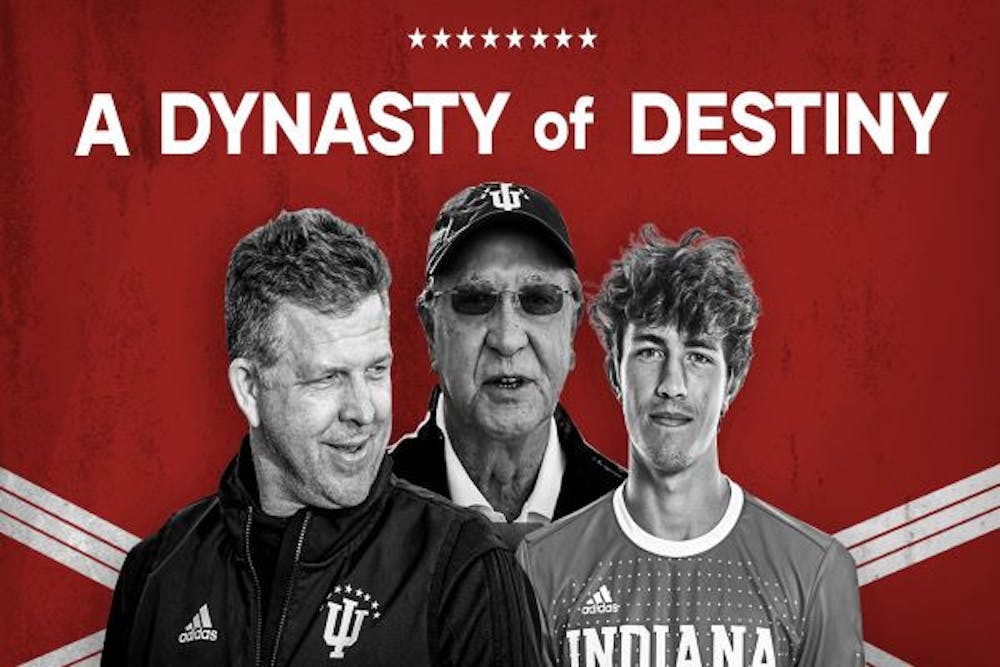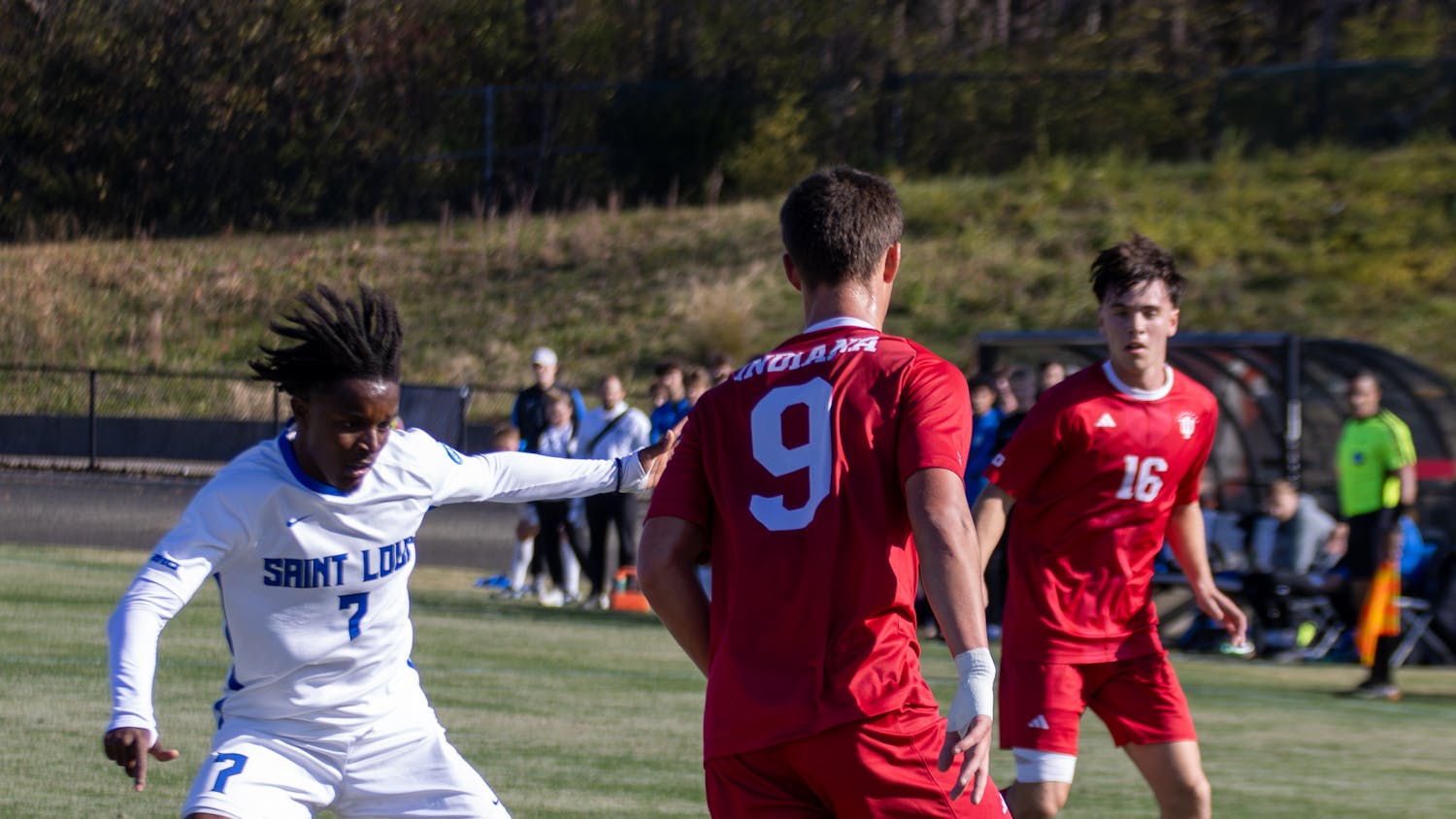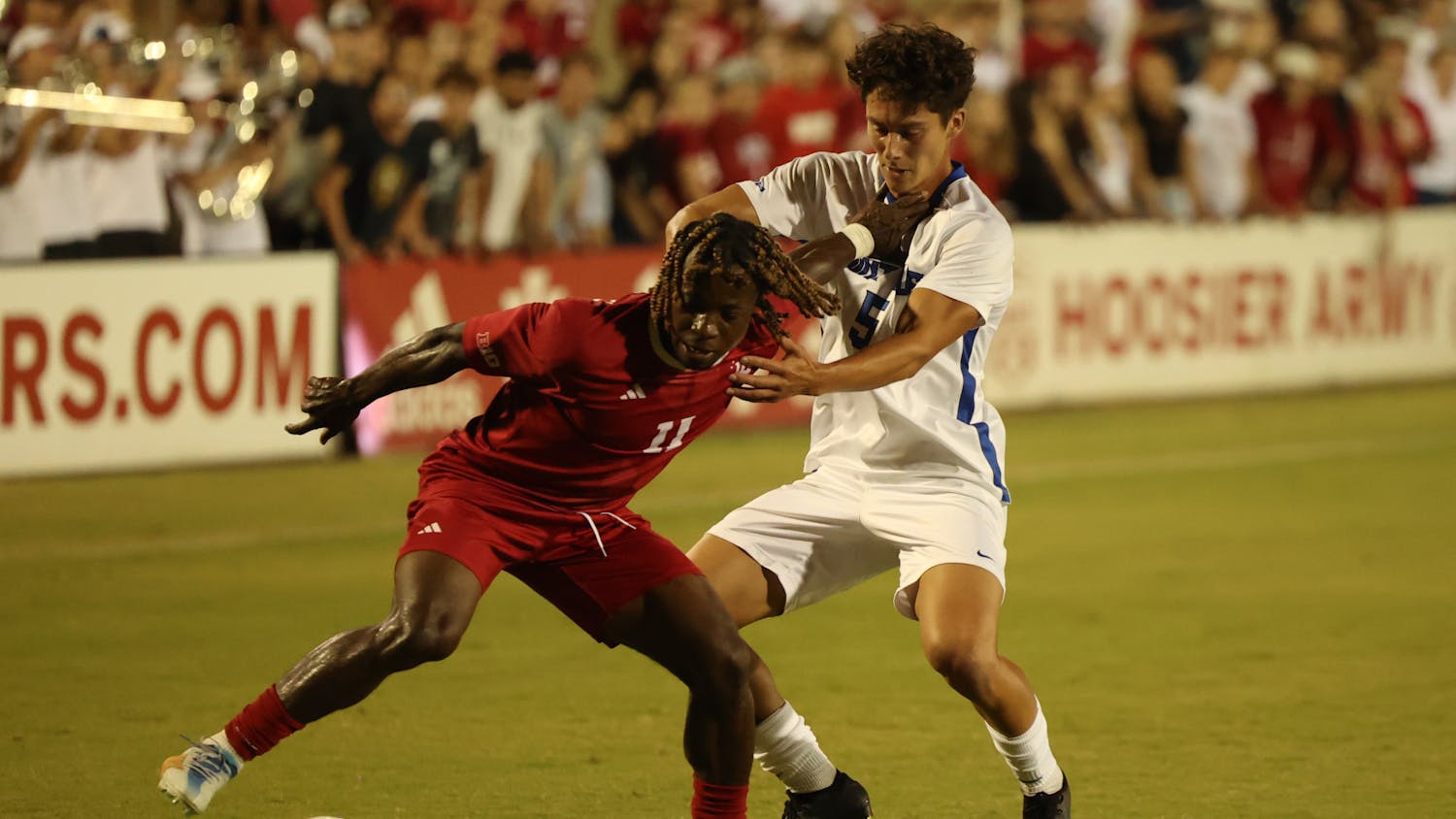He has no clue where the journal is.
Maybe it’s buried deep inside a cardboard box, packed in tight with National Player of the Year plaques, Big Ten trophies, game-worn MLS uniforms, mementos from a lifetime ago. Maybe it’s laying dormant on an end table somewhere, a sheen of dust masking the very ink that once turned a soccer star into a coaching maestro, a Hoosier hero into a Hoosier legend, a son into a disciple.
In 1995, Todd Yeagley sat cooped up in a room halfway across the world, his professional aspirations just beginning. The previous winter he graduated from Indiana University with one of the most illustrious playing careers in program history — a four-time All-American, a three-time Big Ten champion, a National Player of the Year. But he wanted more, and he knew he had more to give.
So that summer he found himself in Italy training with a foreign team in preparation for a new start-up league that was forming in the United States. It would be named Major League Soccer and feature 10 teams scattered around the country, and nobody truly knew if it would last or flame out like every other American soccer league that came before.
Todd was willing to give it a shot.
A few weeks into his international stay, he stumbled upon the journal.
“I don’t remember (writing) it,” Todd says 26 years later. To this day he still can’t recall where it came from.
But the proof is there, in the dark ink that engulfed page after page after page. It was his handwriting, his frantic thoughts, his copious observations. With each stroke of the pen, Todd’s genius was cemented, never to be erased. Thoughts are fleeting. Ink is permanent.
Inside the journal, a coach’s ambition was born.
“I look back and the journal was more about the coaching that I was seeing, the activities, maybe the way they played,” he says. “…I guess I was always prepping to be a coach without ever knowing it.”
It’s a good thing he never stopped writing that summer. His career was about to take off.
On Feb. 7, 1996, the pick was in: the Columbus Crew selected Todd Yeagley, midfielder from Indiana University, previously with the Richmond Kickers of the United Soccer League.
The Crew would be the only MLS team he played for across seven successful seasons. Todd eventually retired after the 2002 campaign, amassing 155 career games played, 129 starts, 11 assists, six goals and a U.S. Open Cup title.
Then, in 2003, dad called.
“All of a sudden I could see the spark,” Jerry Yeagley says. “I could see the passion, how it changed. I began to think gosh, he’s got the part. He’s into it, he loves it. And he certainly does.”
Todd began as a volunteer assistant at IU during the final season of Jerry’s historic coaching career, sending him off with a national title. He remained with the Hoosiers as a full-time assistant until 2008, when the University of Wisconsin anointed him the fifth head coach in program history.
That endeavor in Madison only lasted one season. IU came calling again. Only this time, the Hoosiers were in need of a new head coach to return the storied program back to its roots. Todd couldn’t say no.
But with it came the pressure — not only of coaching at his alma mater, but doing so with the same last name as the man who’d retired as the winningest coach in NCAA Division 1 men’s soccer history.
“I’ve dealt with pressure my whole life, I’m not afraid of it,” Todd says. “But you have to take risks and the risk could fail, and I could’ve come back to IU and failed.”
He hasn’t. In fact, since taking the reins in 2009, he’s produced an eighth national title, 17 MLS draft picks, seven Big Ten titles and six Big Ten Player of the Year selections. Between him and his father, they’ve combined for over 1,000 career coaching wins.
The common denominator between the success of the father-son duo: honesty.
Jerry: “We didn’t have any room for Coca-Cola players who wanted to stand around until the possession changed.”
Todd: “It can’t just be talk. It’s got to be the way you act, the way you interact.”
Even now, as Todd leads the Hoosiers to their fourth Elite Eight appearance under his tutelage, very little has changed. The coffee-filled, marathon-long days, the methodical approach, the laid-back demeanor, it’s all still interwoven into his psyche. If he doesn’t feel a player is fully engaged at practice, he has no problem sending them home for the day. At the same time, he understands what players want in a leader, and he’s more than willing to be that.
“Players ultimately do want discipline, they do want to be held accountable,” Todd says.
And these longings resonate for Todd because he used to be that player. Fresh out of college, living and training halfway across the world, beaming with ambition, unsure what was next.
Just himself, a pen, and hundreds of blank pages waiting to overflow with mindless thoughts and lessons from a lifetime ago.
Where that journal came from — Todd may never recall.
Where that journal is now — irrelevant in his mind.
What that journal would come to represent — the rest of his life.
"The Godfather” has tried almost everything. A glass of wine. Chatting with anyone near him who will listen. Showing up at the last possible moment. Nothing works.
With every minute that ticks off the scoreboard, Jerry Yeagley can hardly bear to watch as the cream and crimson jerseys dart back and forth on the field that’s named in his honor.
His blood pressure continues to rise. When will they score? he mutters under his own breath. No, you weren’t supposed to make that pass! he clamors in his own mind. The anxiety is too much, and there’s still an entire half left to be played.
He gets up. He leaves.
At this point in the 81-year-old’s life there’s only one tried-and-true solution to calm his nerves: don’t watch the game at all. So that’s what he’ll sometimes do, at least until he knows the final score. Then he’ll go back and watch the game in its entirety, sometimes twice, even three times. It all depends on how much analyzing he wants to do. At least now he can take solace in knowing the outcome beforehand.
Less stress, less anxiety, he admits.
But no matter how many times Jerry has tried to briefly step away, he always finds his way back. Back to the juggernaut he spent over 40 years assembling, first securing varsity status, then winning 10 Big Ten titles and hanging six NCAA championship banners.
Back to the only team he has ever known.
It’s been this way ever since he stepped down from the program in 2003, though he says he doesn’t regret the timing. He was 63 at the time and fresh off a sixth and final national title. To celebrate, he jetted off to a lake house in Naples, Fla., for the winter. He golfed. He spent many long days with his grandkids, more than he ever could when he was coaching. For the first time in 30 years, he was free of responsibilities. Free to travel anywhere. Free to do anything.
But Bloomington is where he wanted to be. That was never going to change.
“I still hang out in the shadows,” Jerry says. “I still get my juices flowing, so to say, and sort of scratch my itches by hanging out in the periphery.”
Those itches were persistent, though, like a bad case of chickenpox he couldn’t help but claw at. As a remedy, Jerry hovered around the team and Bloomington as much as possible.
At first it meant ensuring a smooth transition between him and Mike Freitag, the 45-year-old former player-turned-assistant-turned-successor. A sounding board, a mentor, a helping hand, whatever Freitag needed, Jerry made himself available. Once Freitag found his footing, Jerry took on additional behind-the-scenes ventures: collaborating with future IU athletic directors Fred Glass and Scott Dolson, serving on national soccer committees, speaking at coaching conventions, volunteering at IU fundraising events.
If there were opportunities for Jerry to remain involved with the only institution he has ever worked for, he was willing to roll up his sleeves and return the favor. “I bleed IU red,” he says as his slow, gruff voice raises several decibels.
Then, on Dec. 18, 2009, Todd arrived, and when he did, he vowed to bring with him a key piece of wisdom from his dad.
“He learned, and I think I was able to benefit from that, is that he tried to do too much as a younger coach,” Todd said. “As he got older and wiser and more experienced, he realized he had to trust the people around him to help. He would always tell me that. Hire really good people and let them do what they do well.”
Years later, Jerry jokes that Todd doesn’t ask for his opinion as much as he’d like. Sometimes they’ll discuss coaching philosophy and game strategy, but he acknowledges there’s not much he can say that Todd hasn’t seen or heard before. He’s content with that.
Those nervy halves in the press box will have to suffice, grueling as they can be.
So there Jerry is on a mild Friday evening in September 2019. He enters the press box on the south end of Bill Armstrong Stadium near St. Paul’s Church a few minutes before first kick.
He makes his usual rounds, greeting familiar faces with a slight smile, his slow, soothing baritone voice disarming anyone within earshot. Then he takes a seat in front of a placard that reads “Indiana Men’s Soccer Welcomes... Jerry Yeagley,” as if the man who built the program needs the introduction.
Indiana is set to open its season against the University of Pittsburgh in the Adidas/IU Credit Union Classic. Crowd attendance totals 2,847. A portion of The Marching Hundred point their instruments toward the sky, notes of “Indiana, Our Indiana” ring out and reverberate around Armstrong Stadium.
For several minutes Jerry sits stoically. Back slightly hunched over. Hands folded on the table in front of him. Eyes shielded by a pair of dark-shaded Aviators. Gaze never shifting from the 22 men jostling for the first goal of the season.
His mind wanders. His conscience begins whispering to him again. His blood pressure rises.
If IU pulls away with an early lead, maybe he’ll stay the whole game.
More likely, though, he won’t make it to the final whistle.
Instead, he’ll stand up without warning, gently push his chair in, and flee the press box like a shadow into the night. No grand exits or mass farewells, only he and his anxiety-ridden thoughts headed for the parking lot. As he swings his car door open, he can still hear the familiar noises in the distance: the low murmur of the crowd, the booming voice of the PA announcer, the sharp wailing of band instruments.
The anxiety eagerly awaits The Godfather the next time he returns home.
"You’re lucky that your dad and grandpa are who they are,” Ben Yeagley’s peers often would tell him. It didn’t matter how many goals he scored in high school or how much his skin thickened, the verbal jabs never stopped coming, and the pressure never stopped building.
When you’re from Indiana and your last name is Yeagley, there’s a certain level of inherent expectation that you’re born with. Excellence. Glory. Grandeur. Try playing youth soccer when all people want to talk about is your fabled grandfather and nationally revered dad.
Ben doesn’t have to imagine this. He lives it.
At three, he watched as Jerry rode off into the sunset with his sixth NCAA championship, barely old enough to understand the history he was witnessing. At 12, he stood in the locker room at Regions Park in Hoover, Ala., as his father gave an impassioned, fiery speech before the 16th-seeded Hoosiers upset No. 3-seed Georgetown to claim Indiana’s eighth national title.
And now, at 20, he laces up his cleats and shuffles his feet, on the field christened after his grandfather, in front of the head coach who doubles as his dad, wearing the crimson uniform that his namesake helped to immortalize.
But the namesake, for as much prestige as it carries, is a burden that Ben has lugged around since he was old enough to kick a soccer ball. Are you going to follow in their footsteps? Have you thought about coaching at IU? You can’t actually be thinking about doing something other than coaching, right?
He hears the questions. The answers escape him.
“Part of it is letting people down,” Ben says. “Obviously, a lot of people care about IU soccer and they may feel like I’m somehow obligated to coach or at least stay around, but really I don’t want to let myself down.”
At home, Todd is dad. On the field, Todd is coach. It’s a conundrum that Ben has learned to accept, though it’s not always easy.
His first two seasons at Indiana, Ben sat on the bench as he watched dozens of teammates pass him on the depth chart. In 2018, he redshirted. In 2019, he appeared in a grand total of two matches, never logging more than six minutes.
Here he was, the 2017 Herald-Times Player of the Year, a First-Team All-State selection, the Bloomington South High School career goals and assists leader, being asked by his own father to watch from the sidelines. Ben had offers to play elsewhere, but he chose to stay home. This is how he was rewarded?
“As a redshirt, you feel like you’re basically alone,” he says.” You’re there and you feel like the rest of the team is separated from you.”
There were times at practice during his redshirt season, Ben admits, when he was on the cusp of imploding. Maybe he’d lash out and yell at dad. Maybe he’d storm away and refuse to listen.
But he never acted on his impulses, understanding that dad was simply doing his job, and the two of them, together, needed to navigate the fine line that their unique relationship teetered on.
And Todd did his due diligence, familiarizing himself with the father-son coaching dynamic, asking for other opinions, encouraging Ben to speak openly and freely. It’s all a learning process, one that’s been gratifying for Todd, the coach, and especially Todd, the father.
“I know this environment, the people around him, the players, the teammates, the staff is going to have a huge impact on his life,” Todd says. “That’s what I care about. As much as I wanted to coach him, I also wanted him to be in our environment.”
That environment encompasses the total package, not just the practice field, the film room, or the coaches’ office. It’s at home, too.
The Yeagley house is a sanctuary of sorts, a respite for a family that breathes soccer every single day of the week. It’s one of the only places where a stimulated soccer brain is allowed to drift away, get lost in other passions and hobbies, escape the pressure cooker, and take a deep breath.
In this sanctuary, Ben doesn’t particularly care to talk about the team, or even soccer. Sometimes he and Todd will watch a game together on TV — MLS, Champions League, Premier League, they don’t have much of a preference — but mostly he prefers to keep the soccer talk outside the house. “For both of us, IU soccer is a personal thing,” Ben says, “and I don’t see a scenario where I can say something to him that he doesn’t already know.”
For Todd, he sees soccer as a mere commonality, not the linkage that defines their relationship. To reinforce this, he says he’s always looking for different topics unrelated to soccer to talk about with Ben.
However, the Yeagley house acts as only a temporary reprieve before duties inevitably beckon and their relationship necessitates a switch in titles. Ben, the son, morphs back into Ben, the redshirt sophomore midfielder. Todd, the father, returns to Todd, the head coach of IU men’s soccer.
“When I’m at home, I don’t feel like an IU soccer player, I just feel like I’m at home,” Ben says. “But when I’m talking to him around the other guys at the field, he doesn’t feel like my dad, he just feels like my coach.”
And the coach this season is finally rewarding the 5-foot-9, 150-pound midfielder with significant playing time, including his first career start on March 23 against Northwestern.
Following the match, Ben posted a collection of photos on Instagram with the caption, ‘Feels good to be home.’
Bloomington, home.
Armstrong Stadium, home.
Yeagley Field, home.
IU men’s soccer, home.
A future career in coaching, ho-.
Wait, does coaching feel like home to Ben? Is the fate of the family legacy in his hands? What will Grant and Jay, the younger Yeagley brothers, do? When will Ben have the answers?
Jerry knew it in 1973 after resurrecting a destined-to-fail program that wasn’t even recognized as a varsity sport. Todd knew it in 1995 as soon as he began scribbling in that journal. But Ben, he still needs time to figure it out.
“At some point everyone’s got to realize that no matter what the outside’s telling you, your life is dictated by you,” Ben says. “I feel like I’m in control at this point.”
A coaching dynasty dances around his mind. The longing for independence tugs him the other way.
Where is home?






